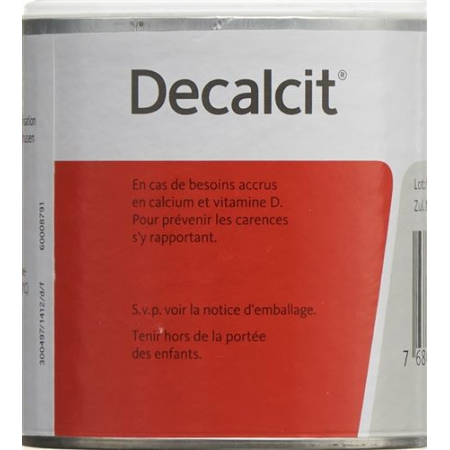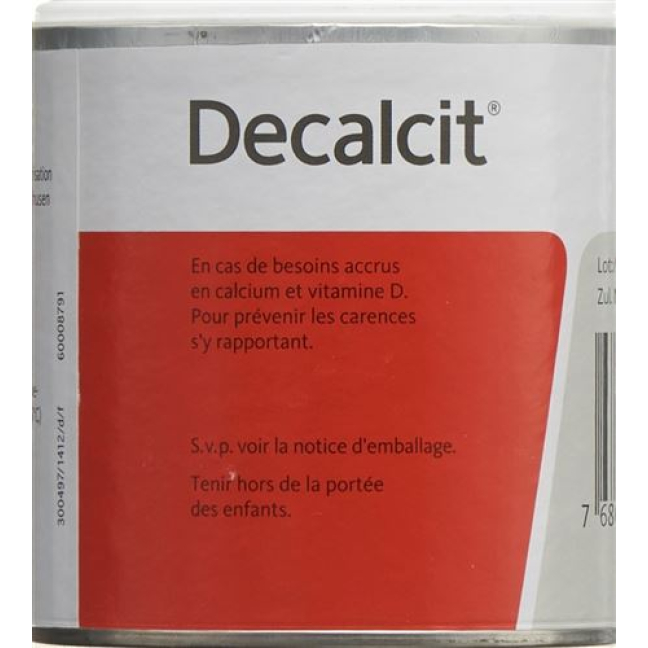Decalcit Plv 100 g
Decalcit Plv 100 g
-
28.48 USD

- Availability: Outstock
- Brand: GEISTLICH PHARMA AG
- Product Code: 168024
- ATC-code A12AX
- EAN 7680190350180
Description
What is Decalcit and when is it used?
Decalcit is a combination preparation with calcium and vitamin D. Calcium is an important building block for the human organism, especially for bones and teeth. Vitamin D promotes the absorption of calcium from the gastrointestinal tract. Vitamin D deficiency does not occur or rarely occurs in healthy people with a balanced diet. However, a lack of vitamin D can occur with an unbalanced diet, with a disturbance in the absorption of food in the intestine or with kidney dysfunction.
Decalcit is suitable for preventing rickets in children, especially in the first year of life and in the winter months. For older people with calcium and vitamin D deficiency or at high risk of calcium and vitamin D deficiency.
What should be considered?
Note for diabetics
1 Decalcit chewable tablet contains 0.3 g digestible carbohydrates.
1 measuring spoon (1g) Decalcit powder for oral consumption contains 0.4 g digestible carbohydrates.
When should Decalcit not be taken?
Decalcit should not be taken if there is already an oversupply of calcium and vitamin D and if you are hypersensitive to an ingredient according to the composition. Preparations containing vitamin D should generally be avoided if the calcium or phosphate content of the blood is increased (hypercalcaemia or hyperphosphataemia) and if there is increased excretion of calcium in the urine (hypercalciuria). Decalcit must not be taken if there is a disorder of bone formation or systemic diseases of the connective tissue with granuloma formation (sarcoidosis) as well as primary parathyroid hyperfunction, bone marrow tumors, bone metastases, urinary calculi and immobilization-related reduction in bone mass. Likewise, Decalcit must not be taken if the kidneys are not performing well (renal insufficiency) or if there are bone changes as a result of renal insufficiency (renal osteodystrophy). Decalcit should not be taken if you are already taking vitamin D or vitamin D-like preparations. If the thyroid gland is underactive (hypothyroidism) or if there is an increased calcium content in the blood, decalcit should not be used for rickets prophylaxis in babies and small children. Since the chewable tablets contain aspartame, patients with phenylketonuria must not take them.
When is caution required when taking Decalcit?
In the case of prolonged treatment and/or mild renal insufficiency, it is recommended to have the amount of calcium excreted in the urine (calciuria) checked regularly. Long-term intake of large amounts of calcium or high doses of vitamin D from food or medicines and at the same time easy-to-absorb basic substances (alkalis, e.g. bicarbonates, which are contained in medicines to bind gastric acid) can lead to a milk-alkali syndrome (calcium metabolism disorder) with the risk of kidney damage. Concomitant use should be avoided at all costs.
Patients with kidney disease, arteriosclerosis and heart disease should be particularly careful.
Contact your doctor before taking Decalcit if you are taking digoxin for heart problems or water-propelling medication (thiazide diuretics) for high blood pressure or edema. Regular monitoring is required. Decalcit reduces the absorption of tetracycline antibiotics. Decalcit should therefore not be taken for three hours before and after oral administration of tetracycline antibiotics. Quinolone antibiotics must be given at least two hours before or four to six hours after taking Decalcit, otherwise Decalcit may make them less effective. The effectiveness of thyroid hormone replacement with levothyroxine can be reduced because calcium can block its uptake. Therefore, a time interval of at leastens four hours to take Decalcit. Since concomitant administration of cholestyramine, orlistat or laxatives such as paraffin reduces the absorption of vitamin D, Decalcit should not be taken at the same time before and after taking them. Due to a reduction in the absorption of bisphosphonates, sodium fluoride, estramustine, iron and zinc preparations, an interval of 2 hours should be observed between taking these preparations and Decalcit.
It should be noted that corticosteroids inhibit the absorption of calcium from the intestine and lead to increased calcium excretion via the kidneys. Other diuretics (furosemide, torasemide) increase calcium excretion through the kidneys. In the case of simultaneous treatment with sleeping/sedatives (barbiturates), antiepileptics (phenytoin) or rifampicin (against tuberculosis), the effect of vitamin D can be reduced due to accelerated metabolism. Food components from spinach and rhubarb (oxalic acid) and whole grains (phytic acid) can also inhibit the absorption of calcium by forming insoluble compounds. Therefore, the administration of calcium supplements is only recommended two hours after eating these foods.
When taking Decalcit, make sure that no other foods or medicines that already contain vitamin D are taken at the same time. The recommended dose of Decalcit should be taken regularly but not exceeded.
Inform your doctor, pharmacist or druggist if you suffer from other illnesses, have allergies or take other medicines (including those you bought yourself) or use them externally.
Can Decalcit be taken during pregnancy or breastfeeding?
Decalcit should only be taken during pregnancy and breastfeeding after consultation with the doctor or doctor.
How do you use Decalcit?
Adults and children over 12 years of age: 1-2 chewable tablets daily (equivalent to 500-1000 IU of vitamin D3 and 480-960 mg of calcium) or ½ - 1 measuring spoon full of powder (equivalent to 375-750 IU of vitamin D3 and 300-600 mg of calcium). The powder, which can be mixed with the daily food (bottle, porridge), is particularly suitable for administration to infants and small children. The chewable tablets, which are chewed and swallowed with a little liquid, are intended for older children and adults.
Infants, small children and children under the age of 12: Babies including premature babies from the 3rd week of life and small children receive ½ measuring spoon of Decalcit powder daily for the first two years of life (equivalent to 375 IU of vitamin D3 and 300 mg of calcium). If necessary, the children also receive this daily dose in the following years of life during the winter months with little sunshine.
The doctor decides on the duration of treatment depending on the severity and type of the disease to be treated.
Stick to the dosages given in the package insert or prescribed by the doctor. If you think the medicine is too weak or too strong, talk to your doctor, pharmacist or druggist.
What side effects can Decalcit have?
Occasionally, increased blood calcium levels (hypercalcaemia), increased blood phosphate levels (hyperphosphataemia) or calcium excretion in the urine (hypercalciuria) can occur. If taken over a long period of time in higher doses, formation of urinary stones or kidney stones in the urinary tract. Milk-alkaline syndrome can develop in the event of an overdose in connection with the intake of basic substances (e.g. agents for binding gastric acid) (see 'When should caution be exercised?').
In rare cases, hypersensitivity reactions can occur. Severe allergic reactions are very rare.
On rare occasionsGastrointestinal disorders such as flatulence, a feeling of fullness, nausea, constipation or diarrhoea, abdominal pain or vomiting can occur.
Rare skin rashes, itching or hives.
If you notice any side effects that are not described here, you should inform your doctor, pharmacist or pharmacist.
What else should you watch out for?
Decalcit may only be used up to the date marked «Exp» on the container. Please always ensure that Decalcit is kept out of the reach of children. Decalcit should be stored at room temperature (15-25°C) and protected from light. Your doctor, pharmacist or druggist can provide you with further information. These people have the detailed technical information.
What does Decalcit contain?
1 chewable tablet contains
active ingredients:
cholecalciferol (vitamin D3) 500 IU
anhydrous calcium hydrogen phosphate 480 mg
(equivalent to 140 mg calcium)
excipients:
dextrates
aspartame
anhydrous citric acid
orange flavor (contains bergamot oil)
Magnesium stearate
1 measuring spoon of powder (= 1g) contains
active ingredients:
cholecalciferol (vitamin D3) 750 IU
calcium hydrogen phosphate dihydrate 600 mg
(equivalent to 140 mg calcium)
excipients:
sugar
Anhydrous glucose
Colloidal anhydrous silicon dioxide
Approval number
12'337,19'035 (Swissmedic)
Where can you get Decalcit? What packs are available?
You can get Decalcit in pharmacies and drugstores without a doctor's prescription.
There are packs of 60 chewable tablets, 100 chewable tablets and 100 g powder.
Authorization holder
Geistlich Pharma AG, CH-6110 Wolhusen
This package leaflet was last published in August 2016 by the drug authority (Swiss smedic).




